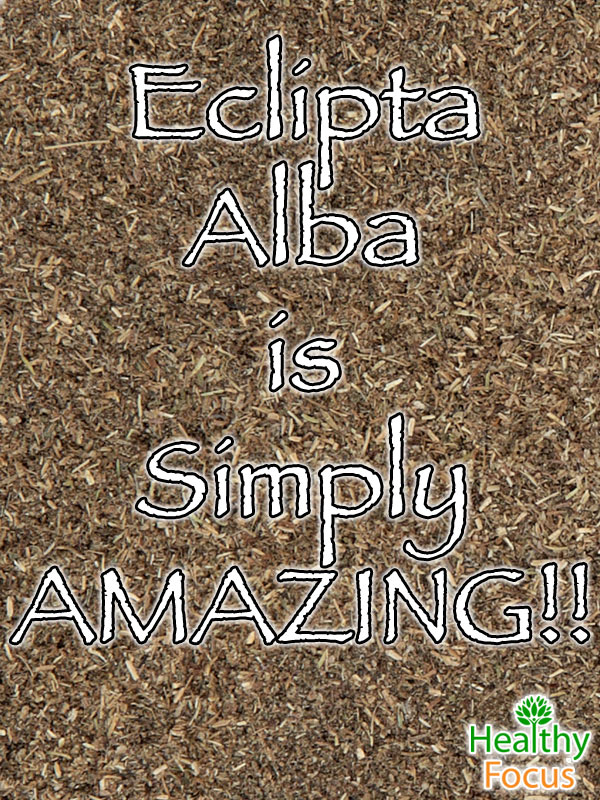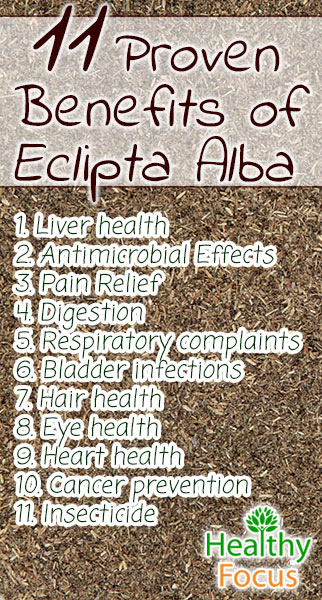Last Updated on December 2, 2019 by Marc Seward
What is Eclipta Alba?
Eclipta alba is a plant species that has been used medicinally for many years in traditional Asian medicine and is widely used in Ayurvedic medicine for a variety of ailments especially related to the liver. Eclipta alba is a member of the sunflower family and is also known as false daisy and bhringraj as well as its scientific name Eclipta prostrata.
The plant is believed to have originated on the Indian subcontinent and now grows in various other warm parts of the world such as Brazil, Thailand and China. The plant bears a small flower that can be red, blue or yellow but it is the white species that is most commonly harvested for its medicinal benefits.
White Eclipta alba has a long tradition if use in Ayurvedic medicine where it is synonymous with the treatment of liver complaints. Nowadays it is used for a wider range of complaints from pain relief to hair health. Both the leaves and flowers of the plant are used to make supplements and it can be used either internally or topically depending on your condition.
Scientific evidence related to its benefits is relatively weak but several published research papers point to its potential – we will look at those in greater detail later in the article. While Eclipta alba is available in supplement form and as an ingredient in creams and salves, it can also be eaten in its raw state.
Health Benefits of Eclipta Alba
Liver Health
Ayurvedic practitioners have long recognized the liver protective abilities of Eclipta alba and have used it to treat liver sicknesses such as jaundice and hepatitis and as part of a detoxification regime.
Several studies both in vitro and animal models have confirmed that the plant does indeed perform a liver protective function. Researchers put the effects down to the flavonoid content as well as several key chemical compounds including wedelolactone. (1)
A study performed on rats also noted the protective effect on the liver. Rats were injected with a research liver toxin called CCL4 and those treated with Eclipta alba leaf extract demonstrated a significantly improved mortality rate which dropped from 77% to 22%. (2)
Antimicrobial Effects
One of the most common historical uses of Eclipta alba is its use in the treatment of infections. Recent research has indicated that this historical use has some scientific basis. A study published in 2011 which investigated the antimicrobial effects of various plants including Eclipta alba.
Eclipta alba was found effective against the 9 different bacterial strains tested. Bacterial species included the common and dangerous strains staphylococcus aureus and E. coli. (3) The researcher recommended further research based on its impressive results and its safety.
Pain Relief
Ayurveda uses Eclipta alba for toothache by rubbing fresh leaves directly onto the affected gums. Several studies have been done to analyze the potential analgesic effects of the plant based on its traditional use in pain relief. A variety of pain tests conducted on mice demonstrated that Eclipta alba had pain relieving effects equivalent to codeine and aspirin. (4)
Other studies have demonstrated that these results are consistent and that Eclipta alba has pain killing abilities based on its ethanolic extract and alkaloids. (5) Based on this evidence, Eclipta alba may be used as an alternative treatment to conventional pain killers.
Digestion
According to Ayurvedic medicine, Eclipta alba can be taken orally to treat an upset stomach. It has been used successfully to treat common digestive complaints like constipation and indigestion. According to Ayurveda, the plant helps restore digestive balance due to its rich variety of organic and chemical compounds.
Respiratory Complaints
Eclipta alba has expectorant properties which makes it useful for treating coughs and congestion associated with the common cold, influenza and chest infections. Because of its known antimicrobial properties, it can help eliminate any infection while easing the flow of any mucus or phlegm.
Bladder Infections
The antibacterial qualities of Eclipta alba makes it an effective remedy when you are suffering from bladder infections. It has been used in Ayurveda to ease discomfort and restore bladder function and research has found that it also has diuretic abilities meaning that it can help promote urination. One study found that a 3 gram dose of Eclipta alba extract had a significantly higher diuretic effect on patients with high blood pressure than a placebo. (6
Hair Health
Hair loss can be very difficult to deal with for many people. It is not just a matter of vanity, but the millions of men and women who experience hair loss can also suffer with low sefl-esteem and many other psychological issues.
Eclipta alba is good for your hair; it maintains the strength and health of your hair and perhaps more impressively it can also boost hair growth. Research published in 2009 investigated the plant’s ability to stimulate hair growth on mice modified to be bald. The results demonstrated that Eclipta alba stimulated the hair follicles and had future potential in hair growth treatment. (7)
According to animal studies, eclipta alba is actually more effective in stopping hair loss than a popular over the counter treatment called minoxidil.
This is great news since minoxidil is laden with harmful chemicals that can cause a multitude of side effects including dry, scaly skin, itching and even breathing difficulties.
Simply mix a little of the herb with some hair healthy oil and massage it well into your hair and your scalp. In time this should help prevent hair loss and may even stimulate the growth of new hair.
Eye Health
Eclipta alba is a rich source of carotene which is an antioxidant that is important to maintain healthy eyes. According to some, it is able to neutralize the damage caused by free radicals and prevent degenerative eye disease and cataracts from forming. The evidence for its ability to improve eyesight is relatively weak with one piece of research showing improved eyesight as a side effect of Eclipta alba treatment. (8)
Heart Health
Eclipta alba might help reduce blood pressure and cholesterol levels. However the evidence for this is not strong and is based on the results of a single small scale pilot study. (8) Researchers suggested that its ability to reduce blood pressure might be related to its diuretic effects.
Cancer Prevention
Ayurveda as well as other herbalists have traditionally used Eclipta alba to treat several types of cancer and study published in 2011 indicates that an ethanol extract of the plant has certain anticancer activities. The single study published related to the plant’s effects on liver cancer noted that it had cytotoxic effects which basically means it effectively destroyed cancerous cells. Researchers concluded that Eclipta alba prevented cancer cell proliferation effectively stopping the disease from spreading. (9)
Insecticide
As well as its health benefits, Eclipta alba has a more practical use that can benefit those of us constantly bothered by bugs. A study published in 2011 was conducted to investigate the insecticide potential of the plant, specifically to combat mosquito borne illnesses.
The research concluded that it had great potential being both effective and an environmentally friendly alternative to the commonly used chemical insecticide products. (10)
Oral Health
Eclipta alba is traditionally used as a remedy for several oral health problems. Because of its known antimicrobial effects, you can use a juice made from the leaves of the herb as a natural gargle to strengthen the teeth and the gums and keep infections at bay.
How to use it
Eclipta alba is available in several different forms including tinctures and capsule or in loose dried form. There is no definitive recommended dose but studies suggest that it is safe and no adverse side effects have been reported. In the only human studies to date, patients took just 3000 mg of the crushed leaves.
For hair growth and general hair health, I have seen a number of recommendations suggesting that you add the plant extract to virgin coconut oil for best effect.
Popular Home Remedies you can make using Eclipta alba
- Gargling with a juice made of the herb’s leaves can help to strengthen gums and prevent bacterial growth in the mouth.
- Simply eating 5 or 6 fresh Eclipta alba leaves each morning can promote all round health and is said to cure constipation.
- Eating the leaves also improves digestion and promotes appetite,
- In Ayurveda, 15 ml of Eclipta alba juice is mixed with an equal amount of milk and drunk first thing each morning to reduce blood pressure.
Using Eclipta alba in cooking
If you can get hold of the fresh herb, then there are more interesting ways that you can add this beneficial plant to your diet instead of taking it as a supplement. In Southern parts of India, it is cooked and eaten with rice or added to a lentil dish.
Before adding the herb to your dish, you should remove the stems and wash the leaves then cut them into very small pieces. Boil up the leaves, add onions, tomatoes and seasoning and cook thoroughly before eating as an accompaniment to a rice dish.
Frequently Asked Questions
What is Eclipta alba used for?
Eclipta alba is an herb belonging to the same family as sunflowers. It is widely used in Ayurveda and comes with a wide variety of potential health benefits. Studies have found that Eclipta alba has antimicrobial, antioxidant and anti-inflammatory properties making it a great choice for a range of illnesses and conditions.
The herb is used for liver health, respiratory conditions, digestive health and to soothe pain. It may also help treat oral health problems, reduce blood pressure and stimulate hair growth.
Is Eclipta alba good for your hair?
According to research done n animals, Eclipta alba can prevent the loss of hair and stimulate the growth of new hair by boosting the health and strength of the hair follicles. According to research, Eclipta alba compares favorably with over the counter treatments for hair loss but has far fewer chemicals greatly reducing the risk of harmful side effects.
Is Eclipta alba safe to use?
Research done to date suggests that Eclipta alba is safe but so far very few studies have been done on humans. The research to date has used 3,000 mg of the herb without any ill effects. If you have any doubts, are pregnant or suffering from a pre-existing condition, it is best to talk to your doctor before taking Eclipta alba supplements.
Can you cook with Eclipta alba?
Yes you can. Eclipta alba is often used in Indian cooking as an ingredient in lentil and rice dishes. Before you add the herb to your dish, remove the stems then clean and wash the leaves. Chop or cut the leaves very fine and boil them up. Try adding some onions, garlic and tomatoes then serve as an accompaniment to some sort of rice dish.
Side Effects and Precautions
While it appears that Eclipta alba is safe, allergic reaction is always a possibility with herbal remedies and there is no data regarding its effects on pregnant or breastfeeding women.
As with most other herbal treatments, you should consult your doctor if you feel concerned.
Final Thoughts
Eclipta alba may not be as well known as its relative – the sunflower but it does come with a wide variety of impressive health benefits. Its antimicrobial, antioxidant and anti-inflammatory properties make this herb a useful natural treatment for digestive health, liver issues, pain relief and may potentially protect against cancer and heart disease.
Have you ever used Eclipta alba and what did you think of its effects. Please let us know why and how you used it. We would be delighted to hear from you.
(1) http://www.ncbi.nlm.nih.gov/pubmed/11883149
(2) http://www.ncbi.nlm.nih.gov/pubmed/725927
(3) http://ann-clinmicrob.biomedcentral.com/articles/10.1186/1476-0711-10-21
(4) http://www.ncbi.nlm.nih.gov/pubmed/15022160
(5) http://www.ncbi.nlm.nih.gov/pubmed/22556819
(6) http://www.ncbi.nlm.nih.gov/pubmed/17472478
(7) http://www.ncbi.nlm.nih.gov/pubmed/19481595
(8) http://www.ncbi.nlm.nih.gov/pubmed/17472478
(9) http://www.ncbi.nlm.nih.gov/pubmed/21575697
(10) http://www.ncbi.nlm.nih.gov/pubmed/21771410



Leave a Reply
You must be logged in to post a comment.